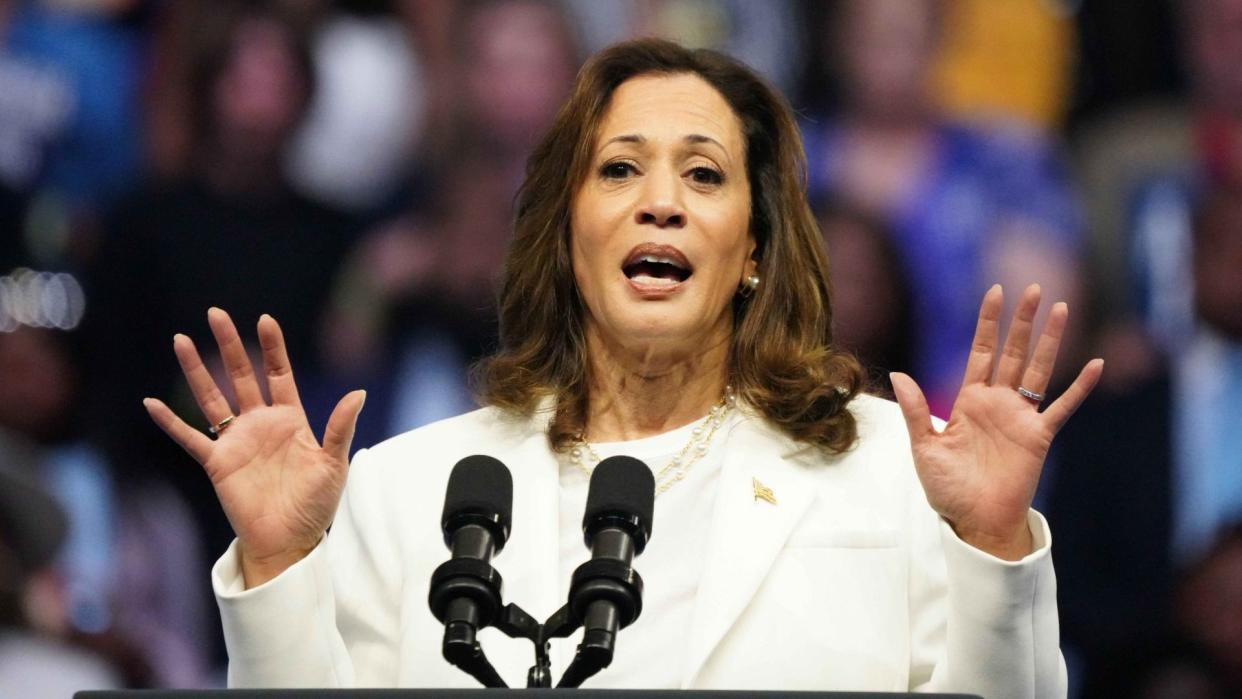5 Ways Harris’ Housing Policies Could Affect Middle-Class Homebuyers

The nation’s affordable housing crisis was one of the chief issues that took center stage in the first presidential debate between Vice President Kamala Harris, the Democratic nominee, and former President Donald Trump, the Republican nominee.
Explore More: I’m an Economist — Here’s My Prediction for Social Security If Kamala Harris Wins the Election
Find Out: 9 Things You Must Do To Grow Your Wealth in 2024
“We know that we have a shortage of homes and housing, and the cost of housing is too expensive for far too many people,” Harris said during the debate.
Last month, the vice president announced a series of proposals aimed at addressing the affordable housing crisis.
Specifically, Harris said she wanted to build 3 million new housing units, provide $25,000 in down-payment assistance to help first-time homebuyers, and cap rent increases at 5% annually.
GOBankingRates examined five ways Harris’ home policies could affect middle-class homebuyers.
Increase Housing Supply
Wayne Winegarden, an economist at the Pacific Research Institute, said housing affordability issues have arisen because the demand for homes exceeds the amount available.
“The supply shortages persist because it is too difficult, costly and time consuming for builders to build new homes,” Winegarden said. “The result is rising prices and declining affordability.”
Harris backed efforts to increase the supply of affordable housing by investing in construction and rehabilitation. While serving as vice president, Harris has supported initiatives to encourage developers to build affordable units by giving them tax credits.
Harris also has supported changes to local zoning laws to allow more multi-family and affordable homes, making it easier for cities to build more homes.
Check Out: 5 Things You Should Stop Wasting Money on If Kamala Harris Wins in November, According to Experts
Provide Rent Relief
The Biden-Harris administration provided over $46 billion to eligible renters facing eviction during the pandemic.
Harris and Republican Vice Presidential candidate J.D. Vance have pointed out that many middle-class people have a difficult time finding affordable housing because large investing firms buy up homes in bulk and mark up the prices.
Big investing firms own about 3% of single-family homes, which they then rent out. According to USA Today, that number could be higher in some cities, therefore making it more difficult for first-time homebuyers to find affordable housing.
Harris also would continue a Biden-era initiative to cap rent increases at 5% to mitigate the housing crisis.
Alec Mena is a state government affairs associate for the Citizens Against Government Waste, a nonprofit watchdog and advocacy group.
In an editorial for The Hill, Mena said, “The Biden-Harris plan would eliminate depreciation write-offs for landlords with at least 50 rental units unless they agree not to raise rent more than 5% annually for two years. The proposal would apply to existing units and exempt new units as well as those that undergo ‘substantial renovation or rehabilitation.”
Basically, Harris’ proposal means the middle class could face higher rentals, and fewer rental units would be available as landlords faced higher tax bills. Investors would be discouraged from buying property to compensate for losing the tax loophole.
Create Climate-Resilient Housing
Harris has linked affordable housing with climate change action.
For example, the Biden-Harris administration announced earlier this month that it would award $69.1 million to properties across 10 states to “support significant energy efficiency and climate resilience renovation in almost 2,000 homes.”
According to a press release from the U.S. Department of Housing and Urban Development, the grants are designed to “generate renewable energy, reduce housing operating costs, promote the use of green building materials, and improve the quality of life for residents by making their homes more resilient to climate hazards.”
Drive Up Housing Demand
Providing first-time homebuyers with $25,000 for down payments is the most controversial component of Harris’ housing plan.
“Harris’ policies all encourage greater demand, but it is an ineffective policy to encourage greater demand when supply growth is constrained,” Winegarden said. “For example, providing 3 million families with $25,000 empowers more demand.
“Incentivizing greater demand while the supply is stagnant will encourage more bidding wars. The result will be more expensive housing, not more affordable housing.”
Create Potential Barriers to Affordable Housing
Winegarden recommended that Harris and other policymakers at the national, state and local levels eliminate “overly restrictive” zoning regulations and “time-consuming and expensive permitting processes.”
“There are also federal regulations harming supply growth, such as more restrictive energy codes supported by the Inflation Reduction Act or the vagaries surrounding the federal Waters Act,” he said. “Reforming these regulations [would] help expand the supply of housing, which [would] promote greater affordability and homeownership.”
More From GOBankingRates
7 Reasons A Financial Advisor Could Boost Your Savings in 2024
4 Best International Cities to Buy a House in the Next 5 Years, According to Real Estate Experts
17 Walmart Items Retirees Should Stock Up on Before Winter Hits
This article originally appeared on GOBankingRates.com: 5 Ways Harris’ Housing Policies Could Affect Middle-Class Homebuyers





